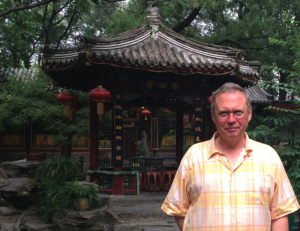Reflection: Buddhist Violence Against Muslims

Andrew Skilton in Beijing
Andrew Skilton (Senior Research Fellow in Buddhism, King’s College London) reflects on Buddhist violence and inter-religious tensions in Nyanmar and Sri Lanka.
Human Rights Watch recently claimed over 1200 Muslim Rohingya homes in Rakhine state had been razed by troops of the pro-Buddhist Myanmar government. At a time when so much attention is focused on the part that Islam plays in contemporary conflict, it is important to recognise that other religions can be – and are – caught up in political violence. Buddhism, typically associated in the Western mind with principles of peace and non-violence – is an interesting case in point, as reflected in two recent articles in Contemporary Buddhism (CB).
For many years Buddhism has basked in a glow of preconception that has it labeled as the religion of peace and compassion. Added to this, an unexpected inversion of colonial influence led those countries of Southeast Asia most impacted by British and French colonial power to develop a self image of superiority in mental culture as an assertion of national identity in the face of the overwhelming technological superiority of western colonisers. This then bolstered the western cliche that persisted for many decades of ‘the spiritual east’, and was a formative factor in the emergence of Vipassana meditation, the foundation of the modern mindfulness phenomenon.
It comes as some surprise then to find our preconceptions, both of Buddhists and Muslims, inverted in several Buddhist countries. The two articles mentioned seek to explain how inter-religious tensions have flashed into life in Myanmar and Sri Lanka, and how not just populist anti-Muslim sentiment, but mob violence perpetrated on Muslim minorities by a Buddhist majority in Myanmar, have not only been supported by Buddhist monks but even instigated by them.
Mikael Gravers has discussed the influence of anti-Muslim preaching in Sri Lanka on Buddhist monks from Myanmar (CB 16, 2015). In both countries the anti-Muslim rhetoric reflects the role of Buddhism as a major component of ongoing identity politics in both countries. In Myanmar the result is mob violence against Muslim minority communities while monks openly campaign for discriminatory legislation that restricts interfaith marriage. More recently, Benjamin Schonthal and Matthew Walton have pointed to distinctive differences between the relevant religio-political organisations in both countries (CB 17, 2016). They argue that despite a number of general symmetries between Sri Lankan and Burmese parties, we should beware a simplistic explanatory label of ‘Buddhist nationalism’. While all these organisations are of relatively recent origin, the Sri Lankan Bodu Bala Sena had roots in the JHU and draws on many decades of vibrant Buddhist participation in national politics, engaging in sophisticated and high level political campaigning. Its counterparts in Myanmar are younger, more grass roots organisations which have emerged into the rather flatter political space that has opened up after the first democratic elections since the military coup of 1962.
Sri Lanka has a Muslim minority that dates from the colonial period, whereas both Myanmar and Thailand share land borders with Islamic states, borders which have now become significant regional security flash points. The violence in Rakhine State, Myanmar mirrors Muslim violence against the Buddhist minority over the border in the Chittagong Hill Tracts of Bangladesh. Alarmingly Thailand too shows signs of a similar anti-Muslim backlash to communal violence in its three southernmost provinces where a long-lasting Islamic insurgency flared into life again at the beginning of this century. Earlier this year Newsweek reported a Thai monk, claiming inspiration from anti-Muslim monks in Myanmar, using social media to raise Buddhist awareness of the threat from Islam in Thailand, having called last year for a mosque to be burned for every monk who had been killed in the conflict (Abby Seif, 04.04.16.).
—
Andrew Skilton is Senior Research Fellow in Buddhist Studies at King’s College London and teaches at the University of Oxford. He has a background in Religious Studies and works both on textual sources using Pali and Sanskrit, and on lived religion in the field in Southeast Asia. He is currently managing a project with the Manuscript Conservation Association in Thailand to record and preserve unique manuscript collections. He edits the journal Contemporary Buddhism.
This blog post is part of our research showcase in conflict studies. You can read more about our conflict research work here.



